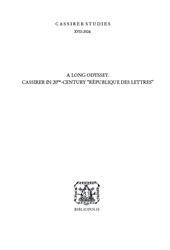Cusanus' symbolische Erforschung der Welt als Schlüssel für eine Philosophie der Kultur nach Ernst Cassirer
P. 151-170
For Cassirer, this article intends to show how the world of culture, which is at the centre of his philosophy of symbolic forms, arises in Nicholas of Cusa (1401-1464) from a symbolic-creative connection between the individual and the cosmos, which leads to fruitful interactions with this Renaissance thinker on a systematic level. The fact that Cusanus is one of a number of important personalities who have characterised Cassirer's thinking from the very beginning becomes clear in the reference to his teacher Hermann Cohen, who, as the head of the Marburg School of Neo-Kantianism, already had a keen interest in Cusanus. Above all, mathematics and religion are at the centre of this, a connection that is very much alive in Cusanus in the questions of precision, unity and multiplicity, finiteness and infinity, which the late Cassirer will also refer to for a better understanding of Cohen's views.
The Cusanian insights that Cassirer further cultivates include, in particular, the limitation of finite knowledge. Where precise knowledge fails, the methodological possibility of exploring the finite ever more precisely or conjecturally (Cusanus) or symbolically (Cassirer) takes effect. With Cusanus, the type of layman (idiota) and his original craftsmanship and technique, which testifies that wisdom calls in the streets, finally leads to the heart of culture. Thus, for example, all mathematical knowledge lies within us. The unity of the mind and the diversity of cultural phenomena: this is precisely the task set by Cassirer's philosophy of culture. [Publisher's text]
Is part of
Cassirer studies : XVII, 2024-
Articles from the same issue (available individually)
-
Information
DOI: 10.1400/299784
ISSN: 2038-6575


